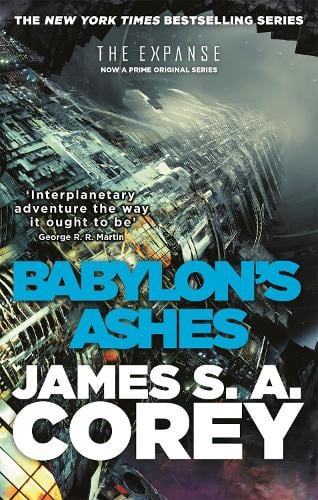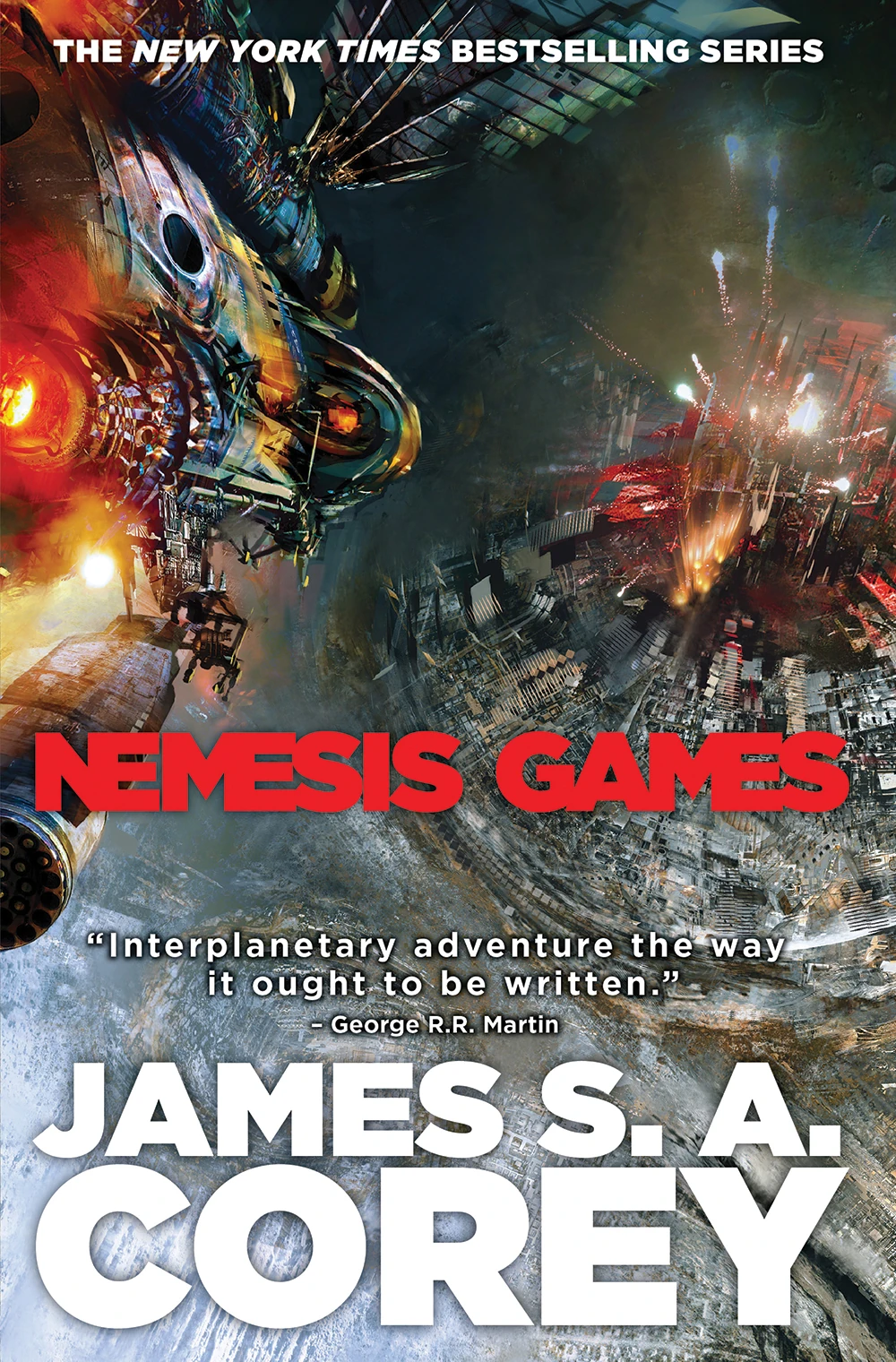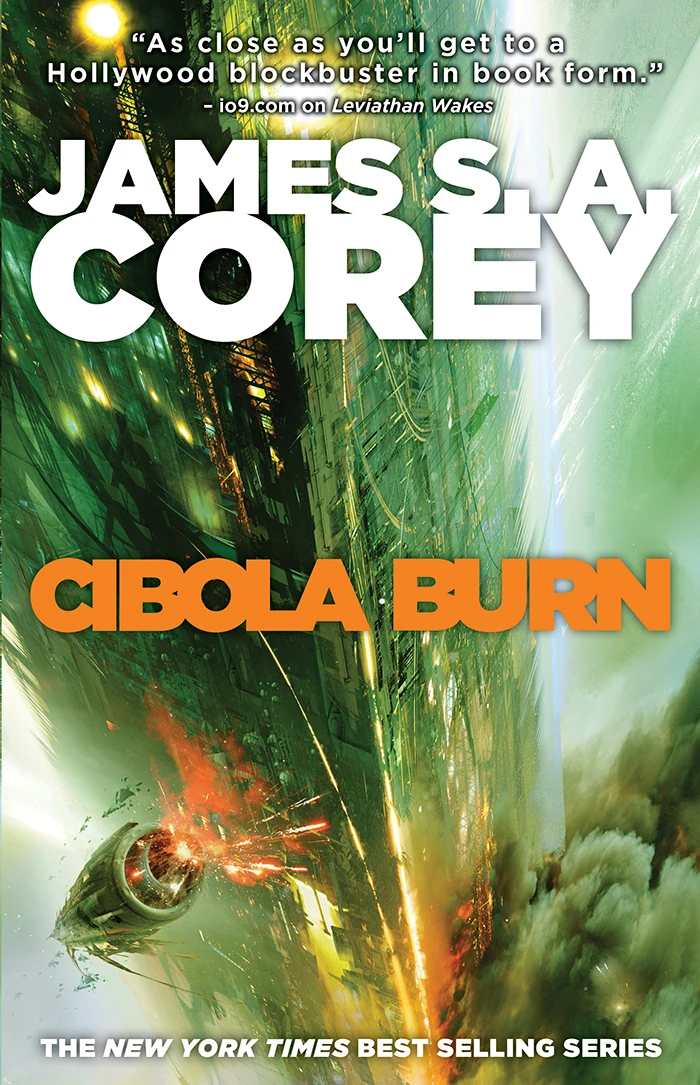Academic politics are finally given the respect they deserve, and all it took was aliens conquering the galaxy.
As an old canard goes, academic politics are so bitter because the stakes are so small; and as an academic in my day job, I can attest to the truth of this. So when a book comes along in which the future of not just humanity, but the whole-ass galaxy depends upon the combined skills of a lab-based research group I am ready to eat it up with a spoon. And my goodness, what a tasty meal it was!
The setting of James S. A. Corey’s new series is a far-future galaxy in which humanity has completed (at least one) colonization effort on the planet of Anjiin. This effort nearly failed, however, and the intervening struggles between then and now have wiped out all records of what happened. Humans only know they are not native to Anjiin through inference: there are biological dissimilarities between their biology and indigenous biology; and there is archaeological evidence showing that humans arrived some thousands of years ago, and nearly died out before managing to spread and flourish. (And isn’t that a prequel saga that I’d like to read!) At the time of this book, humans on Anjiin have developed to roughly the same technology and population spread as humans on present-day earth, with a similar lack of evidence of other extraterrestrial (extra-Anjiinian) life in their astronomical research. But, of course, there is a profoundly different foundation to this lack of evidence. They know there must be extra-Anjiinian life in the universe, because, after, all, they are it.
Our core cast of characters are an elite university research group, who have just completed a brilliant biochemical study. Although humans and human-based biospheres—the plants and animals that (presumably) arrived on Anjiin with the humans—are incompatible with a crystalline-based biosphere indigenous to the planet, this group that has managed to bridge that divide that divide, so that the two biological systems can now interact. It’s a planet-wide triumph, but hot on its heels comes institutional conflict. Funding pressures, politics, and disputes based in status and hierarchy led by rival academics mean that the research group is at risk of being dispersed; its project placed under external control, and its members reassigned to different labs.
Then things get worse. Aliens attack! It is first contact with non-Anjiin based life, and it is the worst possible kind. The aliens are governed by Borg-like creatures called the Carryx, who have conquered uncounted species around the galaxy and forced them to submit, allowed to survive on sufferance as long as they can make themselves useful. (The huge, imaginative variety of aliens encountered under the Carryx aegis is very entertaining, and reminds me a bit of Julie Czerneda's inventiveness.) The Carryx skim humans from Anjiin, taking only the most successful in their various fields—including our biochemical research group--and bring them to Carryx-controlled planet. There, the researchers are given a task: take a berry-like life-form from one planet, and make it edible to a turtle-like creature from another planet. It’s a direct continuation of their most recent discovery: take two distinct biologies, and make them compatible.
This narrative has exactly the same feel and pacing as Corey’s previous epic space opera, The Expanse. Fans of the Expanse books will feel right at home here. The POV shifts across the many characters—including Carryx and other alien entities—in a way that, at first, I found a little disorienting. But given the large number of core characters in the research group, on reflection it worked well to keep them all distinct. Jessyn is plagued with chronic depression and reliant on medication and her brother Jellit to keep her stable enough to work. Rickar stands to come out of the pending institutional reorganization very well, and is for that reason seen as a traitor to the group. Synnia, whose husband died when the Carryx first arrived, refuses to participate in the assigned task, but is open to making trouble for the Carryx when the opportunity arises. Tonner, the leader of the research group, is brilliant at the science and fully devoted to solving the problem, but not terribly skilled at people. Dafyd, a young research assistant, won his position largely by virtue of nepotism (his aunt is well placed in institutional funding circles) and is stronger with people skills than science. Else is the project co-leader, and also sleeping with Tonner, but Dafyd is sweet on her.
(I feel I must add here, however, that Corey scorns to employ such an overused trope as romantic rivalry to build tension between Dafyd and Tonner. Multiple times characters will think of their situation dismissively as ‘bullshit sexual politics’ and the like; and the significance of these relations turns out to be much more interesting then the stupid contrived drama that could never have hoped to rise above the level of boring tedium that is a love triangle.)
This rich cast of characters, combined with other secondary characters, is a crucial part of filling out what would otherwise be a slightly sterile environment. There are not many locations outside the transport ship and lab building. Much of the book is character work—and very good character work. The interests and motivations that characterized all of the players in this drama before the arrival of the Carryx end up structuring their decisions and relations during transit and after arrival in believable and sympathetic ways.
Indeed, this link between Before and After can be seen everywhere in the book structure, not just in the characters. The transport from Anjiin to the Carryx planet is a fascinating study of humans in captivity, a crucible in which people's essential natures are distilled and revealed---and one which not everyone survives. It echoes in a sort of nebulous way the inferred struggle to survive that had taken place when humans first arrived on Anjiin, and almost died before taking over.
On a more local level, the Before and After links can be seen within the events of the book. And since this more immediate Before was an academic institutional drama, the After can be read in that way too. When the research group is abducted and given the berry-turtle task, they are being reassigned to a different lab, exactly as they were afraid would happen at the start. On the Carryx planet, further parallels abound: rival labs, side projects, interdisciplinary endeavours, and squabbles about research credit. The difference, of course, is that the consequences of failure are deadly. ‘Publish or perish’ is literal here, because in Carryx society, if you are not useful, you are dead.
But what really puts the bow on this extremely satisfying power fantasy of lab biochemists fighting the enemy through the power of SCIENCE is the recognition that a huge part of successful science is not the science, but the people. Schmoozing. Networking. Figuring out who wants what, why, and what they’ll do to get it. Navigating institutional politics is a huge component of successful science, and when the institutions and politics are formed of aliens whose worldview, values, and social structures are unthinkably different from everything you’ve ever known, you can Andy Weir your way through the science with the brilliance of a thousand Einsteins, and still get caught out if you don’t know how to figure out what the upper administration actually want and how to give it to them.
Or, if you’re planning a rebellion, how to take it away and crush it into dust.
I mean, I assume. I infer. This is book 1 of a series, but there’s a lot of foreshadowing, and I am here for it.
--
The Math
Highlights:
• Academic politics• Many inventive aliens
• Strong character work
Nerd coefficient: 8/10: Well worth your time and attention
Reference: Corey, James S. A. The Mercy of Gods [Orbit, 2024].
CLARA COHEN lives in Scotland in a creaky old building with pipes for gas lighting still lurking under her floorboards. She is an experimental linguist by profession, and calligrapher and Islamic geometric artist by vocation. During figure skating season she does blather on a bit about figure skating. She is on mastodon at wandering.shop/@ergative

































